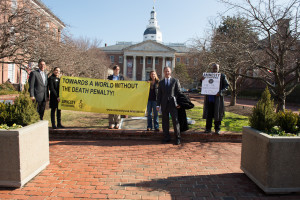The Death Penalty and Human Rights: An Interesting Dynamic

When most people think of the phrase “human rights” it often brings to mind campaigns to protect minority groups or prevent civilian casualties of war. This seems natural, as these are undeniably important and pressing issues and are quite often covered in the media.
But what about something like the death penalty?
A Pew Research poll conducted this year shows that while support for the death penalty has gone down among Americans, the number still remains at a majority of 56%, with only 38% percent in opposition.(1)
Among Canadians this number is also strikingly high. In 2013 an Angus Reid poll found that 61% of Canadians said that the death penalty, abolished in 1976, was warranted for murder.(2)
From where I stand, this is strange. Aside from the fact that one of the most often cited (and arguably heartless) justifications of the death penalty, it’s cost effectiveness, is no longer a given in countries like the United States, there is also the question of human rights.(3)
The Universal Declaration of Human Rights proclaims the right of every individual to not be deprived of life and states that no one is to be subjected to cruel or degrading punishment. Numerous UN conventions and statements have followed up this declaration clarifying this position. More recently in 2005, the UN Commission for Human Rights approved a resolution calling on all states to abolish the death penalty completely.(4)
Additionally, bodies like the Canadian Supreme Court have rebuked the death penalty in cases such as United States v. Burns. Here the Supreme Court claimed that the finality of punishment would aggravate gross injustices committed against those wrongfully convicted, of which there have been many.(5)
These points bring up the question: where do we draw the line between populist sentiment and the supposed “inalienability” of human rights? If these polls are to be believed, a majority of Canadians and Americans alike would be willing to deprive those convicted of murder of what the UN has declared is to be considered an inalienable right.
So, is it that our societies have suddenly gone so morally bankrupt that we advocate human rights abuse? Or is there an indication here that the framers of the UDHR may have been out of touch with what average people in North America truly consider to be a human right? Or is this just a case of norm creation from the top down rather than the bottom up?
Maybe there are deeper justifications that people consider to be trumping what “others”, like the UN High Commissioner for Human Rights, consider to be human rights, but these are interesting questions to go along with our theme on this blog.
Check out this link to information from Amnesty International for some basic info on the death penalty, a map of where it is practiced and why it is opposed on human rights grounds: https://www.amnesty.org/en/what-we-do/death-penalty/
Cited
(1)http://www.people-press.org/2015/04/16/less-support-for-death-penalty-especially-among-democrats/
(2)http://www.thestar.com/news/canada/2012/02/08/majority_of_canadians_support_return_of_death_penalty_poll_finds.html
(3)http://www.forbes.com/sites/kellyphillipserb/2014/05/01/considering-the-death-penalty-your-tax-dollars-at-work/
(4)http://www.amnestyusa.org/our-work/issues/death-penalty/international-death-penalty/death-penalty-and-human-rights-standards
(5)https://www.law.kuleuven.be/iir/nl/activiteiten/documentatie/OldActivities/DeathPenalty/Burns.pdf
